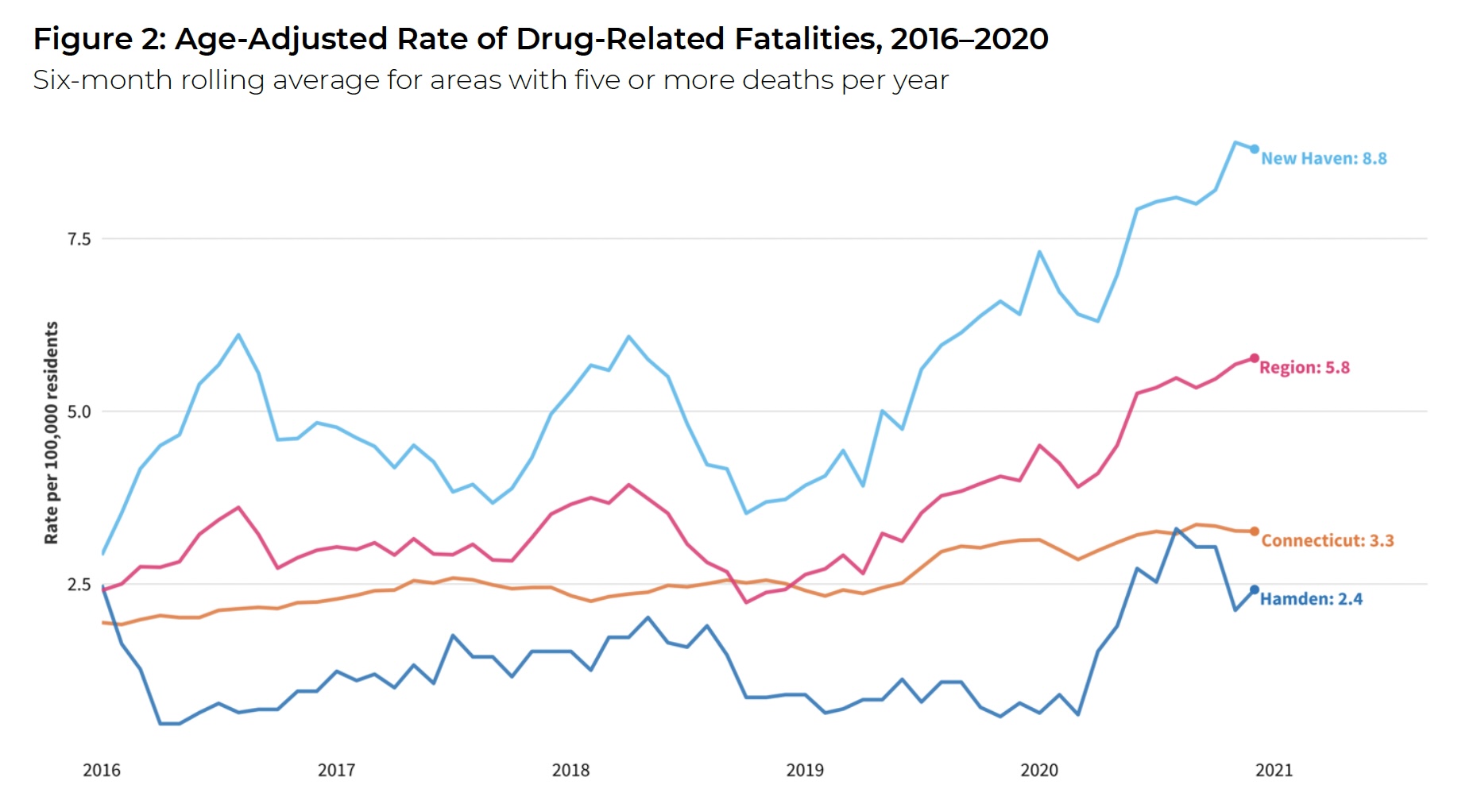Yale professors, admin weigh in on biopharma settlements, opioid crisis
Yale experts commented on the opioid crisis and pharmaceutical settlements in interviews with News.

Courtesy of Datahaven
Yale School of Medicine professors and Yale administrators have taken steps to help address the national opioid crisis through standard-of-care treatments at the medical school and contributions to ongoing conversations about how Connecticut should allocate settlement funds from Purdue Pharmaceutical — a now-dissolved company owned by the Sackler family, a historical Yale donor.
In a large-scale process spanning 15 states, major pharmaceutical companies around the country have been settling lawsuits with the Department of Justice over the promotion of Oxycontin, one of the United States’ most dangerous legal opioid painkillers. One of the companies the DOJ investigated was Purdue Pharmaceutical, which was previously headquartered in Stamford, CT.
Yale School of Medicine professors and Yale New Haven Hospital staff have piloted a number of initiatives to address the opioid crisis. Professors at the Yale School of Medicine emphasized the school’s focus on developing standard-of-care treatments and preventative therapies which can be replicated across the country, as well as providing education to clinicians across Connecticut on the most updated treatments.
“Opioid-related hospitalizations have been on the rise for a number of years,” David Fiellin, professor of medicine, emergency medicine and public health, wrote in an email. “To address this we have created an Addiction Medicine Consult Service.”
According to Fiellin, who is also director of the Yale Program in Addiction Medicine, this includes regulations on the administration of opioids through a stewardship committee and the use of a “controlled substance agreement” for those who will require opioids for a longer period of time.
Associate professor and Medical Director of the Addiction Medicine Consult Service Melissa Weimer explained that one of the main causes for the recent rise in opioid use disorder, or OUD, is the ingestion of illicitly manufactured fentanyl, or other synthetic opioids. These opioids are more addictive than prescribed ones and are procured more easily. According to Weimer, while prescription opioids can cause overdoses and contribute to the problem, they are not the main cause.
“What is not well appreciated by the public is that other complications of drug use such as infective endocarditis, osteomyelitis, pneumonia, renal failure and other complications can occur with injection drug use and non-fatal overdose,” Weimer wrote in an email to the News. “[Yale New Haven Hospital has] seen a rise in all of these conditions.”
University spokesperson Karen Peart wrote that there is a platform embedded into the electronic medical record system which allows clinicians within the Yale Medicine to perform risk assessments and to be well informed before administering any strong painkillers to patients.
In an email to the News, the hospital’s chief of psychiatry, John Krystal, wrote that the Yale Psychiatry Department is working on digital preventative interventions for adolescents, as well as creating large-scale clinical trials to explore different treatments for patients with OUD.
“Yale has created new standards designed to expand access to quality treatment for opioid use disorder in specialty and general medical settings (primary care, emergency departments, hospitals, HIV clinics) using medications that decrease overdose rates by 50%,” Krystal wrote.
Associate professor of medicine Daniel Tobin explained that while it is important to be careful with opioids, universally banning them is not a solution. He believes that in some cases, the pain-relieving benefits of opioids outweigh the risks and can give the patient the best therapy available.
According to him, doctors should take a rational and patient-specific approach, which evaluates the risks and benefits of administering the drug and continues to reevaluate as treatment progresses.
“A decision to prescribe an opioid should be viewed as a therapeutic trial, not a commitment to ongoing therapy,” Tobin wrote in an email to the News. “When used rationally, carefully, and in a risk-benefit framework, opioids have the potential to be useful tools in medicine.”
In 2021, many companies were investigated by the DOJ over their possible involvement in the opioid epidemic through the marketing of their signature drugs. Most prominent among these was Purdue Pharmaceutical, the creator of Oxycontin.
Despite denying any culpability in the crisis, Purdue Pharmaceutical was dissolved on Sept. 1, and its owners — members of the Sackler family — were forced to pay over $4.5 billion in settlement payouts. The Sackler family declared bankruptcy after this dissolution, and the settlement money will go to over 15 states.
Making donations to several academic institutions over the years, the Sacklers have donated money to create tenured positions at the Yale School of Medicine and have a namesake institute associated with the departments of Molecular, Cellular and Developmental Biology, Physics and Engineering.
“Members of the Sackler family have provided gifts over the years to support research at Yale in a number of academic disciplines,” Peart wrote to the News. “The university is not accepting new gifts from members of the Sackler family.”
According to Peart, Connecticut will receive 15 percent of the settlement funds over the next 18 years. The state will create an “Opioid Settlement Remediation Advisory Committee” in order to receive input and make decisions on how to best allocate the money.
She also explained that faculty and experts from the School of Medicine will be participating in these discussions and making recommendations on the best programs related to prevention and treatment for state investment.
“Opioids are potentially helpful but dangerous medications that should be used only when non-opioid therapy can’t achieve treatment goals,” Tobin wrote to the News. “To achieve this, both patients and prescribers need to be aware of the potential risks and benefits and informed consent is critically important.”
The Sackler family had an estimated estate of $11 billion in April.
Correction, Sept. 23: A previous version of the article stated that University spokesperson Karen Peart spoke on behalf of Yale New Haven Hospital clinicians. In fact, Peart spoke on the behalf of Yale Medicine clinicians, which is a separate business entity.








